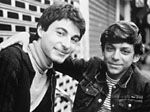COMING OF AGE is a worn-out theme at home, but abroad the tired clich鳠and tropes of adolescence take on new meaning and vigor. In his debut film, Ziad Doueiri places his teenage protagonist Tarek in the turmoil of 1975 Lebanon, the helpless buffer between Arab and Israeli political forces. Played by the director’s brother, Rami Doueiri, Tarek is an impishly smirking slacker, rebelling against his patronizing French teachers (“We created your civilization”), loving disco and Bruce Lee. Yet even this lighthearted youth recognizes his world is about to change forever as he observes a ruthless terrorist ambush outside his school.
WEST BEIRUT
written and directed by Ziad Doueiri
runs February 4-10 at Varsity
Here, and in a tense subsequent scene at Beirut’s “Green Line” (which separates the Muslim and Christian halves of the city), Doueiri ably conveys the incipient violence of a city devolving into chaos. A cameraman for Quentin Tarantino, he has a stronger grasp of shot selection than story—but you forgive the narrative lapses for the strength of individual scenes: Tarek’s apartment-bound parents tenderly trying to preserve their marriage; Tarek and his buddies roaming the city’s bustling, vibrant prewar streets, then finally venturing across the DMZ to encounter the charismatic madam of a notorious brothel.
It’s a ragged, disjointed, autobiographical story, but one that carries the power of a series of unexpected, agonized postcards from a confused young friend. Tarek’s city is changing faster than his hormones. He falls for a Christian girl, while his best friend’s family goes fundamentalist. “Is Paul Anka the work of Satan?” Tarek demands of brash, shrimpy Omar, his partner in Super-8 moviemaking. (The acting quality of these neophytes doesn’t match the adult veterans of the cast, but who cares?)
Even while trying to guess where in Beirut’s 17-year civil war the film’s later episodes take place, you’re caught up in the terrifying, liberating anarchy. Like Hope and Glory, West Beirut shows how adaptable yet vulnerable children are to the effects of war. Tarek and Omar marvel at the contrails of dogfighting Israeli and Syrian jets overhead, yet remain intent on developing their precious Super-8 film. Surrounded by the horrors of adult-caused war, they remain bell-bottomed innocents, grooving to ’70s music and fantasizing about unobtainable women.
When frustrated Tarek denies he’s an Arab, insisting he’s Phoenician instead, his teen identity crisis takes on a broader political significance. He’s clinging to a childish fantasy that fractured Beirut will no longer support. Thanks to Doueiri’s imperfect but poignant film, we see how the adult Tarek’s divided self-image will be shaped by war, even when peace finally arrives.








